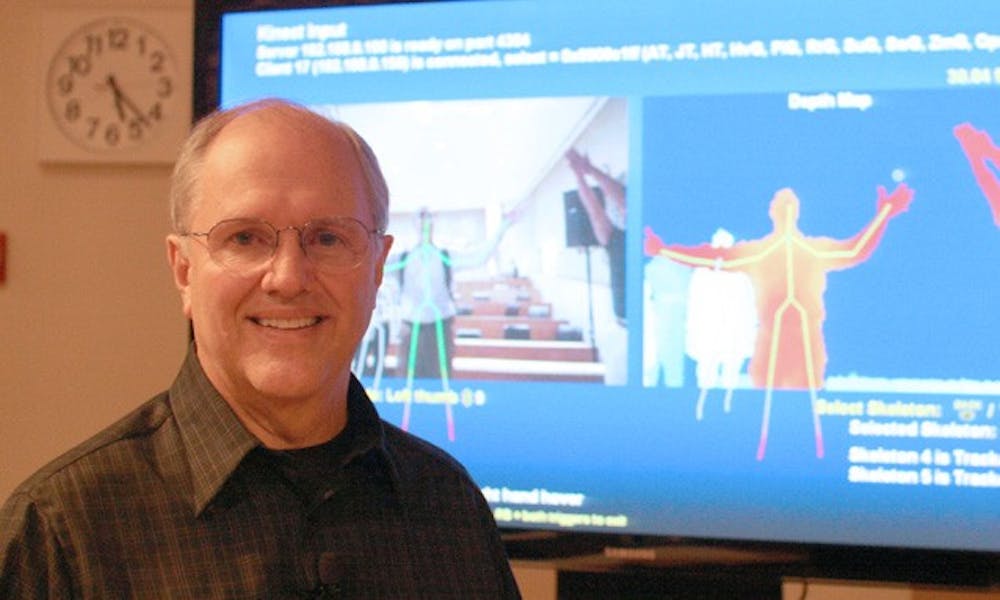Fuqua School of Business students stepped into virtual reality yesterday when Craig Mundie, Microsoft’s chief research and strategy officer, took the stage at Geneen Auditorium and invited them to explore the company’s newest inventions.
Duke was the first stop on Mundie’s tour of universities across the country. He delivered a presentation titled “More Like Us: Human-Centric Computing” that premiered some of Microsoft’s most state-of-the-art technology and gave the audience a glimpse into the future of human-computer interaction.
Microsoft has a goal to develop products that can address the needs of those without access to standard technologies, Mundie said. These devices could include low-cost robotic triage doctors, capable of accessing medical data and providing diagnoses, that could be placed in third-world countries where healthcare is unavailable, he added.
The focal point of Mundie’s presentation was his demonstration of the Kinect Sensor and a real-time 3-D projector, the first of its kind. Mundie stood in front of the sensor, gesturing and making vocal commands to open a menu, shop for birthday gifts and interact with others in the virtual world as the audience watched behind 3-D glasses. This kind of 3-D technology is different than that used in movies, Mundie explained, because in movies the 3-D imagery is created beforehand whereas the new projector creates it instantly. After the presentation, students were invited to test the technology for themselves.
In addition to his executive position at Microsoft, Mundie is a member of President Obama’s Council of Advisors on Science and Technology. The Chronicle’s Lauren Carroll was able to speak with Mundie prior to his presentation.
The Chronicle: As Microsoft’s chief research and strategy officer, what does your typical work day consist of?
Craig Mundie: My job is interesting because it’s a composite of things that range from technology policy to oversight of our research operations; part of it is overall management of the company as well. Then, I have a lot of start-up businesses in health and robotics and other areas... so I don’t have a single thing I focus on every day.
TC: What are the biggest challenges currently facing your department at Microsoft?
CM: Well, I think we always face the challenge of a very rapidly evolving technology landscape. Today we have the largest computer science research operation in the world, and we try to apply [our] people to improve our understanding of how technology is likely to evolve and how we can apply it to our business. It’s a rapidly expanding field where there’s just lots and lots of competition, so our [biggest] challenge is always to ensure we can get the maximum transfer of our research assets to our product groups at the earliest possible time.
TC: It seems as if these technological changes are occurring at an almost exponential rate. Do you see any stagnation or limitations in the future?
CM: No. One of the nice things about software is that in a sense you can think of it as a manifestation of people’s ability to think and to create. It’s one of the really nice parts about being in the software business. It’s a very malleable technology, and so if you want to apply it to health care or education or other scientific disciplines... you can write some code that would help people do something about it. It’s that malleability that means it doesn’t have a particular end of its useful life.
TC: Is Microsoft developing any technologies or programs specifically for university use?
CM: As far as applications, we don’t do as many that are industry-specific, but many of the partners of Microsoft... do that, and I think there is an increasing focus on products for education both at secondary and university levels. One of the things I think will be more and more important are these distance-learning capabilities... that will allow students globally to have access to some of the world’s best lectures and scientific information.
TC: What advice would you give to current undergraduates pursuing computer science?
CM: It’s important to think about generational changes in the way that computing has evolved in the past... training in multidisciplinary thinking will be important to students, and I would encourage undergraduates to think about that as well.
TC: If you could pursue any other profession, what would it be?
CM: Well, I’ve always been fascinated by computers; I started building them when I was 12.... I would say the other thing I’ve always had a real strong interest in was medicine, and particularly the intersection between medicine and computing.
TC: Last week, the Federal Communications Commission approved the use of white space [empty radio and television channels] for “Super Wi-Fi.” What exactly is “Super Wi-Fi,” and how is it different than what we already use?
CM: This Super Wi-Fi, also called White-Fi, is a way of finding a spectrum that would allow the Wi-Fi kind of networking to happen over a wider area at a low cost.... [It’s] an effort to use some of the same waves that have been used for FM radio and TV... and take the unused channels in a city and use them for this kind of communication.... If you wanted to leave the building and walk out to the shuttle bus and maintain your connectivity, we can do that now.
TC: What kind of computer do you use?
CM: You mean brand? I build all my own, but my work laptop is a Lenovo.
Get The Chronicle straight to your inbox
Signup for our weekly newsletter. Cancel at any time.

